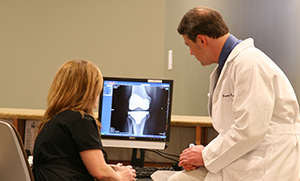Getting Healthy for Surgery
Your dedicated team of health professionals has one goal: to get you moving to a healthy you. But no team can succeed without its most important member — and that’s YOU!
Meet Your Joint Replacement Center Team
Your health is your responsibility, but you’ll have an entire team of specialists working at your side.
- Orthopedic Surgeon – Your physician/surgeon will perform your total joint replacement and manage your care while at the Joint Replacement Center.
- Anesthesiologist/Certified Registered Nurse Anesthetist (CRNA) – Your anesthesiologist — a physician or advanced practice nurse — will meet with you on the day of your Pre-Testing Appointment and the day of surgery, review your health history and determine the most appropriate anesthetic for you.
- Case Manager – Your case manager — a registered nurse or social worker — works with your surgeon and other team members to help with your discharge plan, including insurance questions, outpatient therapy, home equipment and/or skilled nursing care (if needed).
- Registered Nurse (RN) – Your Joint Replacement Center nurse is specially trained in orthopedics and responsible for your nursing care following your surgery. Your RN will follow the surgeon’s instructions and will teach you, your Joint Coach and family about your health and safety needs — including what you need to do before and after surgery, as well as help plan your discharge from the hospital.
- Physical Therapist (PT) – Your physical therapy team plans your physical rehabilitation after surgery and helps you learn how to use your new joint. These specialists will help you regain your independence, including range of motion, muscle strength and balance to walk safely. Before surgery at your Physical Therapy Screening visit, you’ll learn exercises to build your strength and help you recover faster.
- Occupational Therapist (OT) – Your OT will help you plan safe ways to perform your daily activities, such as dressing, bathing and instruct you with equipment, if needed.
Get Moving to A Healthier You
It’s time to start thinking like a ‘well’ person. (That’s how we see you!) Here are three steps you must do that will get you moving in the right direction:
-
Choose a Joint Coach. It can be your spouse, family member or close friend who can commit to helping you prepare for surgery and recover afterwards. Your Joint Coach needs to be with at your physician visits prior to surgery and at your Admission and Testing Center appointment, if possible. You’ll be given a lot of information there, so your Joint Coach will need to help you remember it all. Everyone must understand your care instructions, both before and after surgery.
- Your Joint Coach should be there to watch your therapy sessions and learn how to help you become independent faster.
- Once you’re home, your Joint Coach will need to stay with you for at least one week and drive for you, until you are able.
-
Activate Your MyMemorial Patient Portal. Memorial Hospital offers a patient portal called MyMemorial. By logging in to MyMemorial, you can become more involved and educated about your health by viewing your patient profile and test results. Signing up is easy:
- Go to the Health Information Management department at Memorial Hospital Belleville with a photo ID and provide your e-mail.
- Access your e-mail for your login ID, one-time password, and link to the MyMemorial Patient Portal. Follow the instructions, and start exploring the Portal! For more information, please call (618) 257-5300.
- Stop Smoking! It is essential that you stop, because smokers have a higher rate of infection and complications. Memorial Hospital is nonsmoking facility, inside and outside. If you need help, just ask or call 1-800-QUIT NOW or visit quitnow.net.
- Diabetes Care – It’s important to work with your physician to control your blood glucose levels, especially before joint replacement surgery. Uncontrolled diabetes is associated with increased complications, including decreased wound healing and an increased risk for infection. Please work with your diabetes management team and your surgeon to manage your diabetes and decide if it’s safe to proceed with surgery.
6-8 Weeks Before Surgery
To recover faster from your surgery, you have to get moving on many items well in advance. As we’ve said from the beginning, your health is your responsibility. We’re here to help you. So, let’s get started!
- Advanced Health Care Directive – If you already have one, please bring it when you visit the Admission and Testing Center. If you don’t have one yet, now’s a good time to complete one. The staff in the Admission and Testing Center will be able to provide you with the Advanced Directive form and help you complete it.
-
Nutrition – It is important to eat a well-balanced diet now to get your body ready for surgery. Good nutrition will help your body recover faster after surgery. Unless your physician says otherwise due to a medical condition, for one month before surgery:
- Take an over-the -counter Vitamin D supplement
- Have one protein bar or drink every day
- Returning to Work – Your orthopedic surgeon will let you know when you can return to work.

Physicians at The Joint Replacement Center
Dr. Kevin Baumer
Dr. Steven Horner
Dr. Michael Hughes
Dr. Donald Johnston
Dr. Charles Lehmann
Dr. Gregory Simmons
To make an appointment with one of these orthopedic surgeons, simply call (618) 767-7000.

